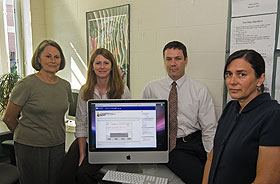  |
| HOME | THIS ISSUE | CALENDAR | GRANTS | BACK ISSUES | < BACK | NEXT > |
New seminar available online to assist in course developmentby Elizabeth Omara-Otunnu - October 6, 2008
| ||||
Instructional design staff in the Institute for Teaching and Learning are offering a new online seminar to help faculty design and teach online courses. The online seminar is an extension of the generally face-to-face services offered by the University’s instructional designers to faculty wishing to develop a new course or revise a course they already teach. “The Instructional Design team offers support to faculty in adopting pedagogical best practices in face-to-face, online, and blended courses,” says Desmond McCaffrey, manager of instructional development services. “Many faculty members walk through the door and ask for help. This online seminar can be used as an alternative, or before or after working with one of us to develop or enhance a course.” The online seminar also models for faculty members what they would be doing in an online course, McCaffrey notes. “It demonstrates that online teaching and learning can work and be successful.” The seminar, launched on a pilot basis last spring with faculty from the School of Pharmacy, is now available to all UConn instructors, by going to http://itl.uconn.edu/idd/. There are two versions, one directly accessible on the Internet and the other in HuskyCT. McCaffrey says he believes the seminar is timely. “Interest is growing, people are becoming more aware of the potential of online teaching and they want to do it well.” He says that as a percentage of the overall number of courses, the number of online courses at UConn is still relatively small. He notes that proportionately more online courses are offered in the summer than during the academic year, but faculty are increasingly beginning to teach online courses during the fall and spring semesters. McCaffrey notes that designing a course is a time-intensive process: “When you add in a new element – such as an online component – you add to the level of complexity by introducing something faculty have to become familiar with.”
Adds Marny Lawton, an instructional designer who led development of the seminar, “You don’t need to be an expert in technology to teach an online course, but you do need an understanding and a certain level of mastery to be comfortable doing it.” For those who already have some experience of using educational technology, say Lawton and McCaffrey, the seminar will be a tool enabling them to do what they envision online. For others, it will be an introduction to a new way of teaching. The two hope the online seminar will also help advertise the University’s instructional design and support services for faculty who are developing new courses or retooling existing ones, or looking for new technical skills. Instructional designers have expertise in curriculum development, learning theory, educational technologies, and assessment tools. They also work as project managers, coordinating where necessary experts in network, graphics, media, and programming, as well as the library liaisons and administrators who deal with grading. “We want faculty to realize they don’t have to do it all themselves – that’s what Instructional Design is here for,” says Lawton. “The tools, the software, and the skills that may be needed are spread across campus. Instructional designers have the training and connections to bring them all together.” Adds McCaffrey, “Faculty are still the subject matter experts. That doesn’t change. But we bring a whole array of coordinating tools and project management that help pull the pieces together, which is tough for one individual to do.” |
| ADVANCE HOME UCONN HOME |

